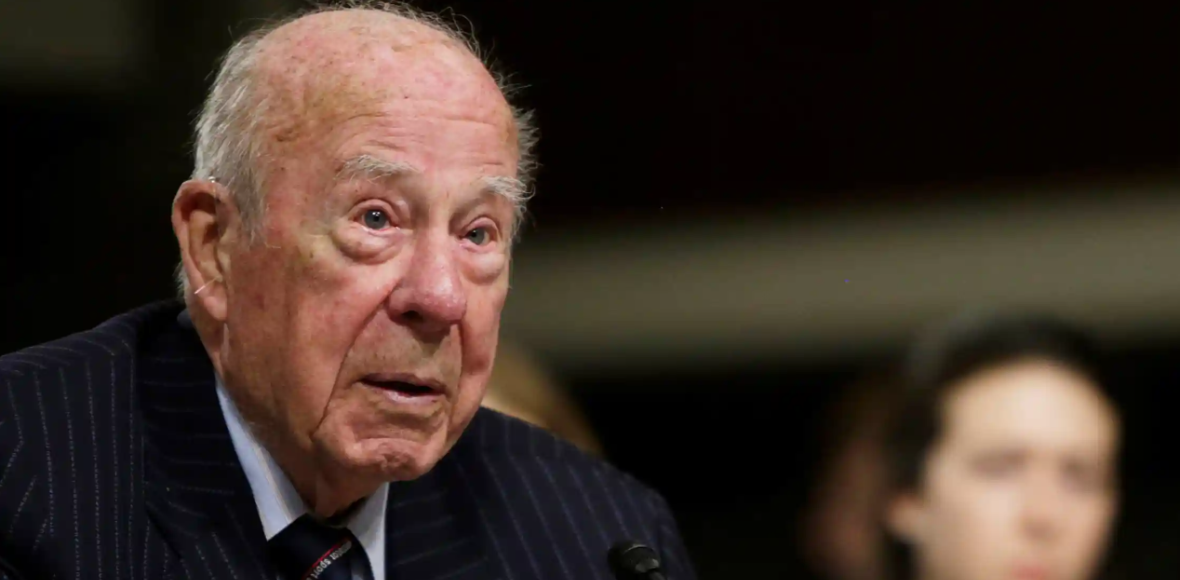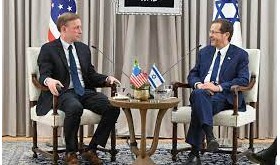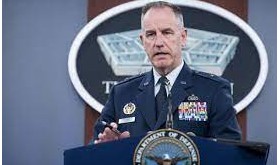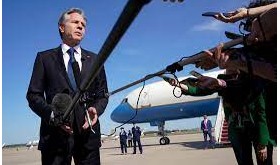
Without Reagan the cold war would not have ended, but without Shultz, Reagan would not have ended the cold war.” This quotation of Mikhail Gorbachev – from the preface of In the Nation’s Service, a biography of George Shultz – now has a bittersweet taste. Reagan died in 2004, Shultz in 2021 (at 100) and Gorbachev in 2022. The cold war is having a renaissance that threatens the legacies of all three.
Vladimir Putin has returned Russia to authoritarianism, suspended its participation in the last US-Russia arms control pact and, with the invasion of Ukraine, put the risk of catastrophic confrontation between major powers back on the table.
This would have been heartbreaking for Shultz, a second world war veteran who as secretary of state was at Reagan’s side during the summits that ended the cold war. He was a statesman and Republican of the old school who endorsed the wars in Vietnam and Iraq. He was also complicated.
In the Nation’s Service, which Shultz authorised but did not control, portrays a man who loved not wisely. He was loyal to Richard Nixon during Watergate, loyal to Reagan during Iran-Contra, loyal to his party when it was cannibalised by Donald Trump and loyal to Elizabeth Holmes when Theranos, her blood-testing company, was exposed as a fraud.
“It’s a thread through his life, excessive loyalty, and it grew out of his service in the marines in world war two, where obviously if you’re in combat your life depends on the loyalty and support of your comrades in the Marine Corps,” says the book’s author, Philip Taubman, a New York Times reporter and bureau chief in Moscow from 1985 to the end of 1988.
“But as he carried that on through his life, it was a very strong impulse and so he stuck with Nixon too long.”
Shultz, who studied at Princeton and the Massachusetts Institute of Technology and became dean of the University of Chicago, was Nixon’s labour secretary and led an effort to desegregate southern schools systems. He was the first director of the Office of Management and Budget before becoming treasury secretary.
He resisted many of Nixon’s requests to use the Internal Revenue Service (IRS) to investigate his “enemies” but did give in to the demand to pursue Lawrence O’Brien, a top Democrat. The Watergate scandal engulfed the White House but Shultz did not resign until May 1974, three months before Nixon himself.
Speaking at a Stanford University office in Washington, Taubman, 74, says: “I pressed him on this involvement in the Larry O’Brien investigation. I said, ‘I don’t understand how you allowed that to happen and why you didn’t resign at that point.’
“His basic defence was he understood Nixon was involved in misconduct and he thought that had he resigned and Nixon had put someone else in the treasury secretary’s job, there would have been less of an obstacle for Nixon to use the IRS in punitive ways. It was a kind of self-congratulatory explanation. He clearly should have resigned before he did.”
Reagan brought Shultz into his cabinet in 1982. Shultz hoped to ease cold war tensions but met with opposition from anti-Soviet ideologues.
Taubman, who spent a decade writing the book, with exclusive access to papers including a secret diary maintained by an executive assistant, explains: “It was incredibly brutal. It was probably, if not the most ferocious infighting of any postwar American presidency, certainly one of the top two. He just ran into a buzzsaw.
“The people around Reagan who set the tone for foreign policy in the first year … were hardliners on the Soviet Union. What they wanted to do was not contain the Soviet Union, which had been the American strategy since the end of the second world war. They wanted to roll back Soviet gains around the world and Soviet influence.”
Shultz rarely got to meet Reagan one-on-one. “He was mystified by Reagan and he was puzzled and unsettled by the turmoil in the administration. For a guy who’d lived through the Nixon administration, you’d think he would have been a hardened internal combatant.
“He would come back to his office and tell the aide who recorded all this in his diary, ‘I can’t get through to the president. How is it that the secretary of state can’t meet with the president of the United States to talk about US-Soviet relations?’ … It took several years before he and Reagan began to kind of connect.
“One of the things that was clear, as I did the research, was just how disengaged Reagan was. There would be decisions taken that he would sign off on and then they would be reversed by people under him. It was incredibly chaotic and he wouldn’t grasp it by the lapels and say, ‘OK, I agree with George, this is what we’re going to do.’ He just let this turmoil fester until the second term.”
In February 1983, history was given a helping hand when a blizzard forced Reagan to cancel a Camp David weekend. He and his wife, Nancy, invited Shultz and his wife to dinner. Shultz could see that for all his hot rhetoric about the “evil empire”, Reagan hoped to ease tensions with Russia.
“If you’re looking for the key moments in the ending of the cold war,” Taubman says, “you have … the realisation among the two of them that they have in common a fundamental desire to wind down the cold war, the ascension of Gorbachev, his appointment of Eduard Shevardnadze as Soviet foreign minister, and the beginning of real negotiations over a huge range of issues: arms control; issues involving countries like Cuba, Nicaragua, Angola where there was proxy fighting going on; human rights issues, which Reagan felt very strongly about, as did Shultz, which Gorbachev and his predecessors had resisted but Gorbachev eventually began to agree to discuss.”
The capitalist Reagan and communist Gorbachev held their first meeting in Switzerland in 1985. Shultz went to Moscow to negotiate the terms of the summit and made sure the leaders kept talking in private. He was pivotal in making another summit happen in Iceland the following year.
But again he was deferential to a fault, this time over Reagan’s “Star Wars” program.
Taubman says: “Shultz completely understood that the Strategic Defence Initiative (SDI), the space-based missile defence exotic technology, was unworkable but he wasn’t brought into the discussions until the last minute, just a few days before Reagan was going to give his speech about it on national television. He opposed it. He tried to get Reagan to back away.
“When that failed, he tried to get Reagan to be less grandiose about the objectives – failed in all of that. Then … he got in line, saluted and supported it right through the summit in Reykjavik in 1986 where, had Reagan been more flexible about Star Wars, they might have achieved far-reaching arms control agreements. But Reagan wouldn’t give ground.”
Gorbachev visited Washington in 1987 and signed a landmark deal to scrap intermediate-range nuclear missiles. Reagan went to Moscow in 1988. The tension drained out of the cold war and Shultz was “indispensable”, Taubman argues. “He was literally the diplomat-in-chief of the United States and he and Shevardnadze were the workers in the trenches who took the impulses of Gorbachev and Reagan and turned them into negotiations and then agreements.”
“When that failed, he tried to get Reagan to be less grandiose about the objectives – failed in all of that. Then … he got in line, saluted and supported it right through the summit in Reykjavik in 1986 where, had Reagan been more flexible about Star Wars, they might have achieved far-reaching arms control agreements. But Reagan wouldn’t give ground.”
Gorbachev visited Washington in 1987 and signed a landmark deal to scrap intermediate-range nuclear missiles. Reagan went to Moscow in 1988. The tension drained out of the cold war and Shultz was “indispensable”, Taubman argues. “He was literally the diplomat-in-chief of the United States and he and Shevardnadze were the workers in the trenches who took the impulses of Gorbachev and Reagan and turned them into negotiations and then agreements.”
But Shultz’s triumph was short-lived. “He was saddened when George HW Bush came into office because Jim Baker, the incoming secretary of state, and Brent Scowcroft, the national security adviser, decided Reagan and Shultz had gone too far too fast with Gorbachev. They put a pause in relations and that really annoyed Shultz and disappointed him.
“He probably was somewhat hopeful under [Russian president Boris] Yeltsin, where things began to look more promising again. Then with Putin he was involved in so-called ‘track two’ diplomacy, where he and Henry Kissinger and some other former American officials would go to Moscow or Beijing and have consultations with Russian and Chinese leaders, talking about things that couldn’t be talked about in official diplomatic channels. He began to realise that Putin was taking Russia back into an authoritarian model.”








